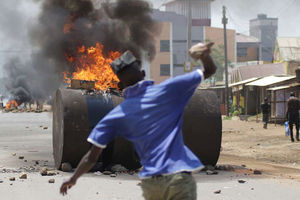
Residents say they are usually asked to pay bribes of up to Sh10,000 to village elders just to have their cases heard.
In Nyeri's Majengo area, families seeking justice for victims of sexual abuse claim that they have been asked to pay bribes of up to Sh10,000 to village elders just to have their cases heard.
These disturbing allegations form part of a wider outcry from residents accusing the now-disbanded Nyumba Kumi committees and informal courts of widespread corruption, shielding criminals, and mishandling gender-based violence (GBV) cases.
In response, the government has dissolved the Nyumba Kumi elders' committees and banned informal justice systems in the Majengo area. This comes amid a growing number of complaints from residents about the abuse of power, and a deepening public mistrust of the local leadership.
Nyeri Central Deputy County Commissioner Maina Ngunyi announced the decision during a tense public security meeting held on Wednesday. “The complaints are too many and it is time to give others a chance and allow the community to elect new leaders,” he said.
This announcement follows a series of deeply troubling incidents in the informal settlement, including the brutal killing of seven-year-old Tamara Blessing, whose body was found buried under a house just days after she went missing. The suspect is said to be someone known to the family.
On May 31, a bishop from the True Disciple Ministries was lynched by a mob after being accused of sodomising a nine-year-old boy.
Both incidents sparked outrage and raised questions about the role of community elders in maintaining law and order. During the security meeting, angry residents questioned how such crimes could occur under the watch of Nyumba Kumi leaders without being noticed, with many accusing the elders of prioritising bribes over justice, particularly in cases of GBV.
“The kangaroo courts are protecting fake pastors who abuse children. These cases go unreported and unresolved,” said Mr Ngunyi.
The administrator called on residents to elect leaders of integrity and to ensure that women and young people are included in community decision-making processes. “It is also important that the youth are mentored so they can gradually take up leadership roles,” he added.
Ms Mary Kiragu, a resident, urged the government to establish a support centre for survivors of sexual violence. She said many suffer in silence due to the absence of counselling and legal aid services.
Another resident, Mr Nderitu Mwai, criticised parents who send their children to beg in Nyeri town, thereby exposing them to exploitation and abuse. He also linked the prevalence of GBV to overcrowded living conditions in the area, where entire families often share a single room. “This creates situations in which daughters become vulnerable, even in their own homes,” Mr Mwai said.
Residents also expressed concerns about the ongoing sale of illegal alcohol, which they claim is protected by former village elders. They said that whistleblowers face intimidation, and that the police response to emergency calls remains sluggish.
Nyeri Town MP Duncan Maina, who chaired the meeting, expressed alarm over the rampant use of bhang and illegal alcohol in the area. He urged the police to launch a security operation and arrest individuals whom the residents described as 'untouchable'.








